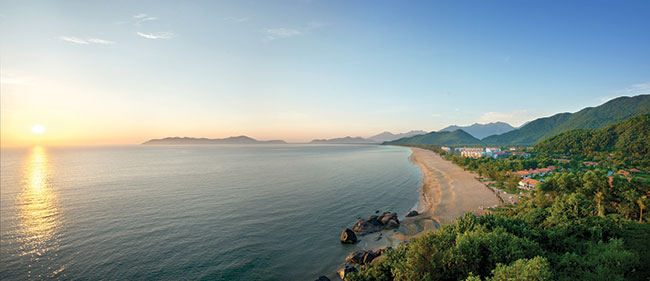Spectre of dead fish scares tourists

Tourism in four central provinces has taken a massive hit in the wake of recent mass fish deaths
Statistics from travel agencies revealed that the number of tourists travelling on the recent Reunification Day and May Day holiday increased at least 20-26 per cent over the same period last year. However, the most crowded spots were to the north and south of the country in places like Phu Quoc, Phan Thiet, Ninh Chu, Dalat, Nha Trang, the Mekong Delta, Sapa, Halong Bay, Co To, and Quan Lan.
While other tourist destinations in the north and the south of Vietnam were overrun, travel agencies received many cancellations in the four central provinces of Ha Tinh, Quang Binh, Quang Tri, and Thua Thien-Hue after thousands of dead fish washed up onshore.
Over the four-day holiday, businesses on well-known beaches in the affected region saw a sharp reduction in the number of visitors. Notably, seafood restaurants were deserted, as were the seafood markets.
“My family kept our four-day tour to Quang Binh as planned, but we chose to enjoy Phong Nha-Ke Bang national park and Nuoc Mooc spring instead of Nhat Le beach,” said Thien Huong, a tourist from Hanoi. Her family group of six adults and seven children travelled to Quang Binh with large packages of food and fresh water to feed their children. Despite their love of seafood, which is one of the main attractions of the area, the family refused to eat it, opting instead for local pork, chicken, and freshwater fish.
“Many travel agencies complained that they received lots of cancellations to these provinces. I could see many agencies advertising rooms for sale due to a shortage of clients during the holiday,” said Trinh Dinh Minh, marketing manager at PYS Travel.
Local authorities have received many complaints from travel agencies about their slow reaction to the crisis and their failure to address public concerns.
“The four central provinces reacted slowly. However, we highly appreciate the prompt actions of Danang authorities who have checked and tested the quality of sea water, keeping beaches open for swimming every morning, and providing edible fish. In fact, tourism in the coastal city has not suffered as much as in the four other provinces,” said Minh.
Although the mass fish deaths have not significantly affected Danang yet, guests and tourists do not have enough information, and so are reacting to rumours.
“We have already received cancellations from some groups for bookings in May to July. We hear that the Chinese market, which makes up 50 per cent of total Danang tourists, have started to reconsider, and are looking at other destinations further south. If this happens, we are afraid that Danang tourist numbers will be dramatically reduced,” said Nguyen Duc Quynh, executive assistant manager of Furama Danang.
He also said that news about polluted seawater and dead fish was published in Korean newspapers, which would definitely affect the number of tourists to Danang, especially as this market accounts for nearly 20 per cent of tourists coming to Danang.
What the stars mean:
★ Poor ★ ★ Promising ★★★ Good ★★★★ Very good ★★★★★ Exceptional
Latest News
More News
- Scandinavian Airlines and Vietnam Airlines broaden agreement with new routes (November 25, 2025 | 17:04)
- Halong Cruise Port welcomes over 3,100 international visitors (November 12, 2025 | 18:06)
- Vietnam.travel climbs to second place in Southeast Asia website rankings (November 12, 2025 | 18:01)
- Cat Ba named among Southeast Asia’s top island adventures (November 11, 2025 | 18:09)
- Vietnam Airlines' Lotusmiles partners with ALL Accor to unlock more rewarding journeys (November 08, 2025 | 10:25)
- International arrivals to Vietnam hit record high in October (November 06, 2025 | 18:22)
- Etihad launches flights from Hanoi to Abu Dhabi (November 04, 2025 | 15:14)
- Oxford deepens Vietnam partnerships in healthcare, education, aviation (November 04, 2025 | 11:45)
- Vietjet lifts aviation training to new heights with Airways Aviation (October 22, 2025 | 15:06)
- UOB Vietnam promotes ecotourism in Quang Tri's 'Kingdom of Caves' (October 21, 2025 | 16:14)
















 Mobile Version
Mobile Version